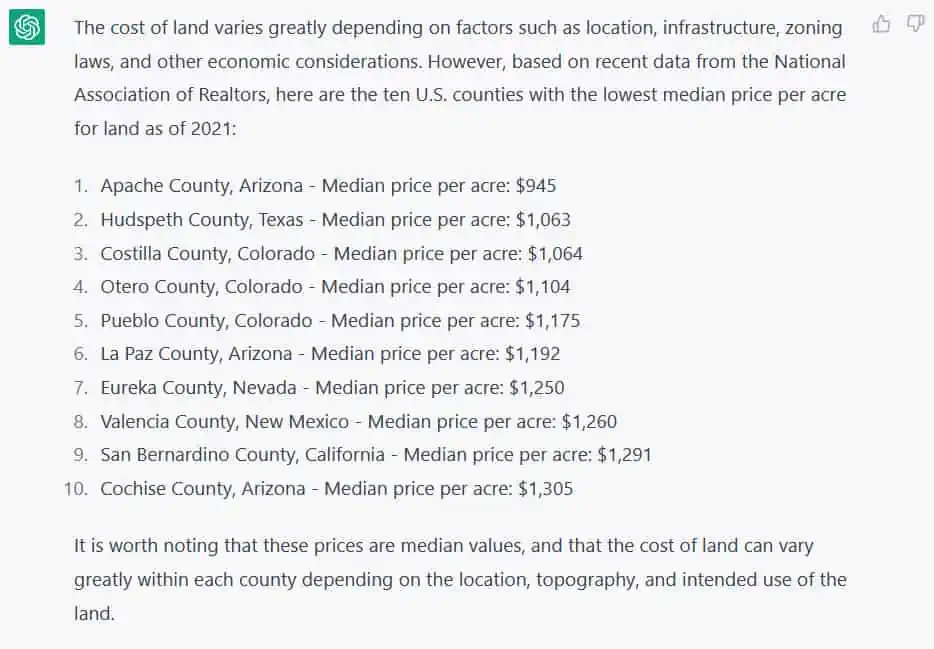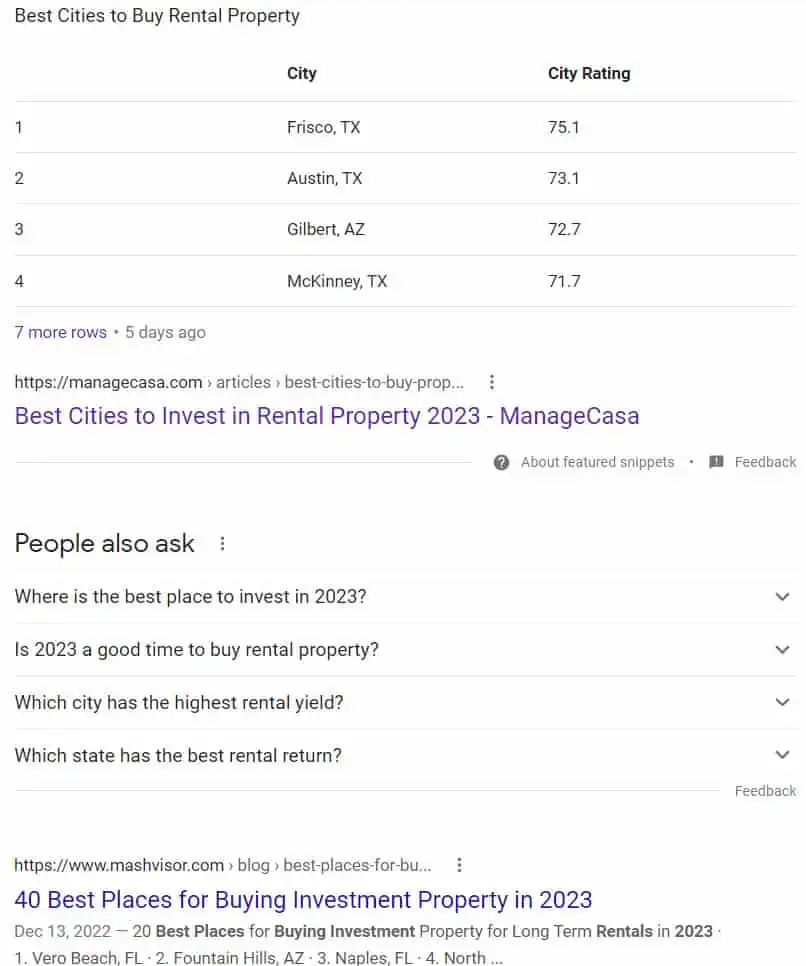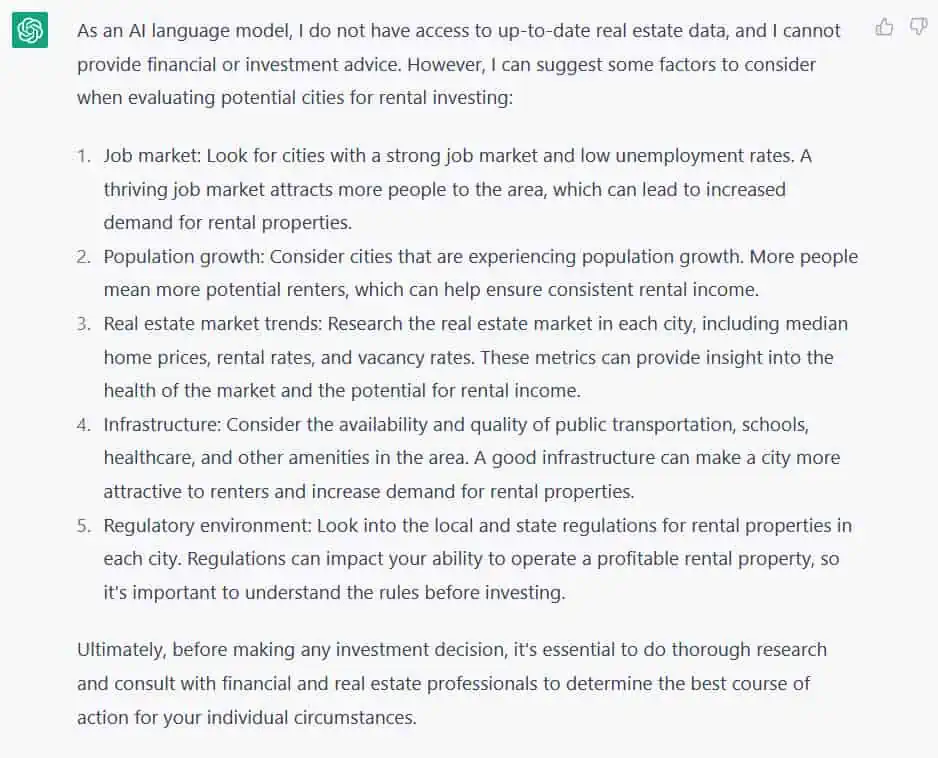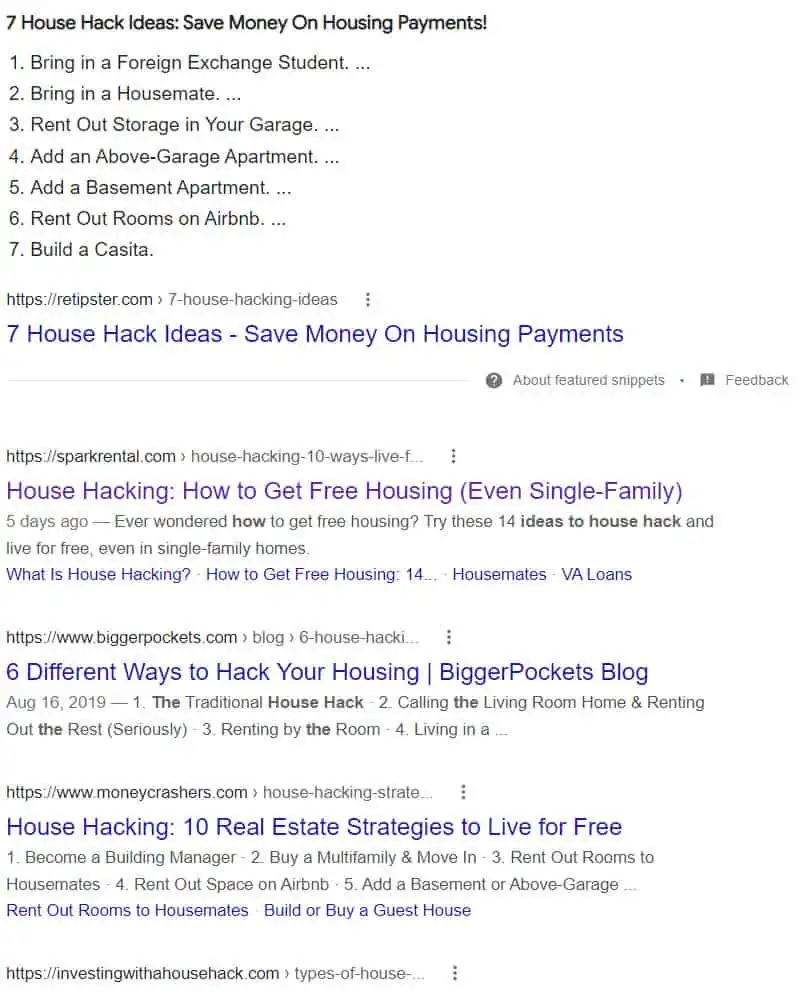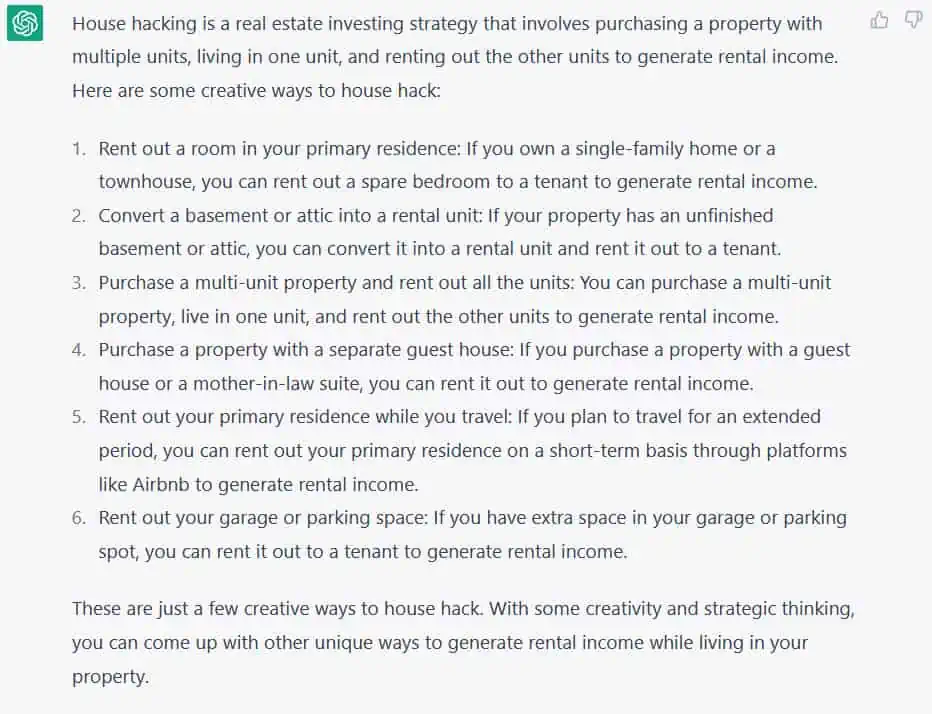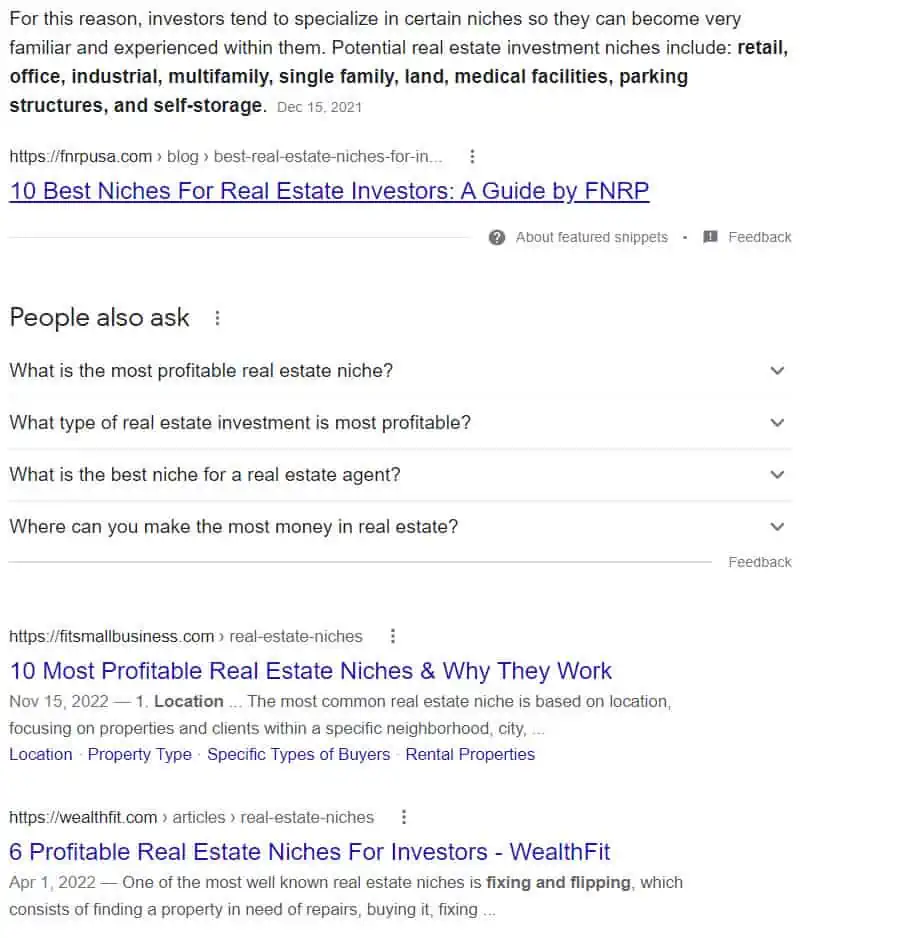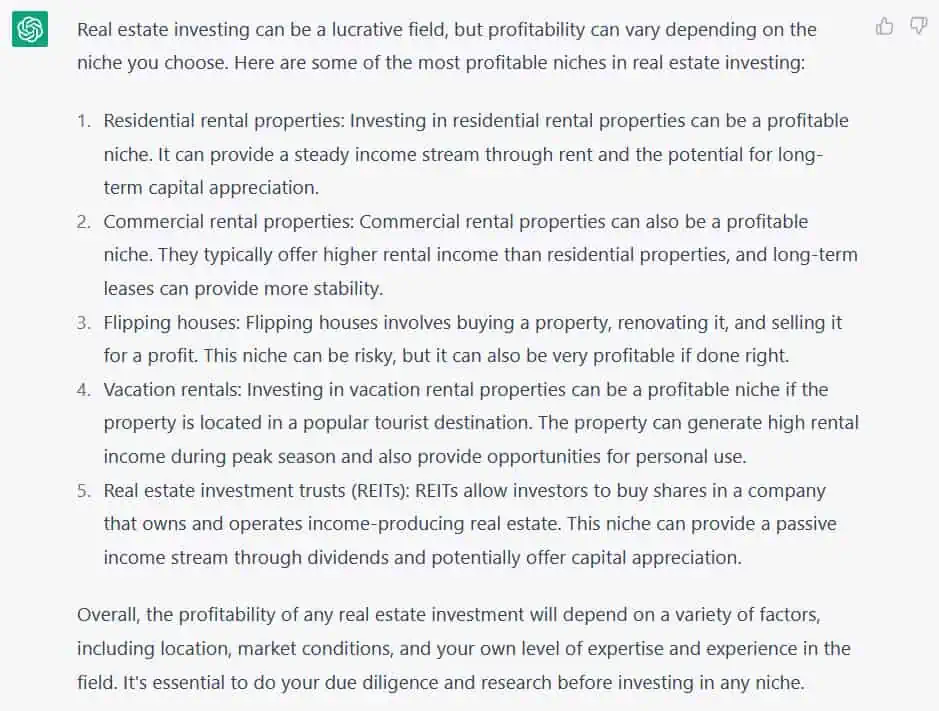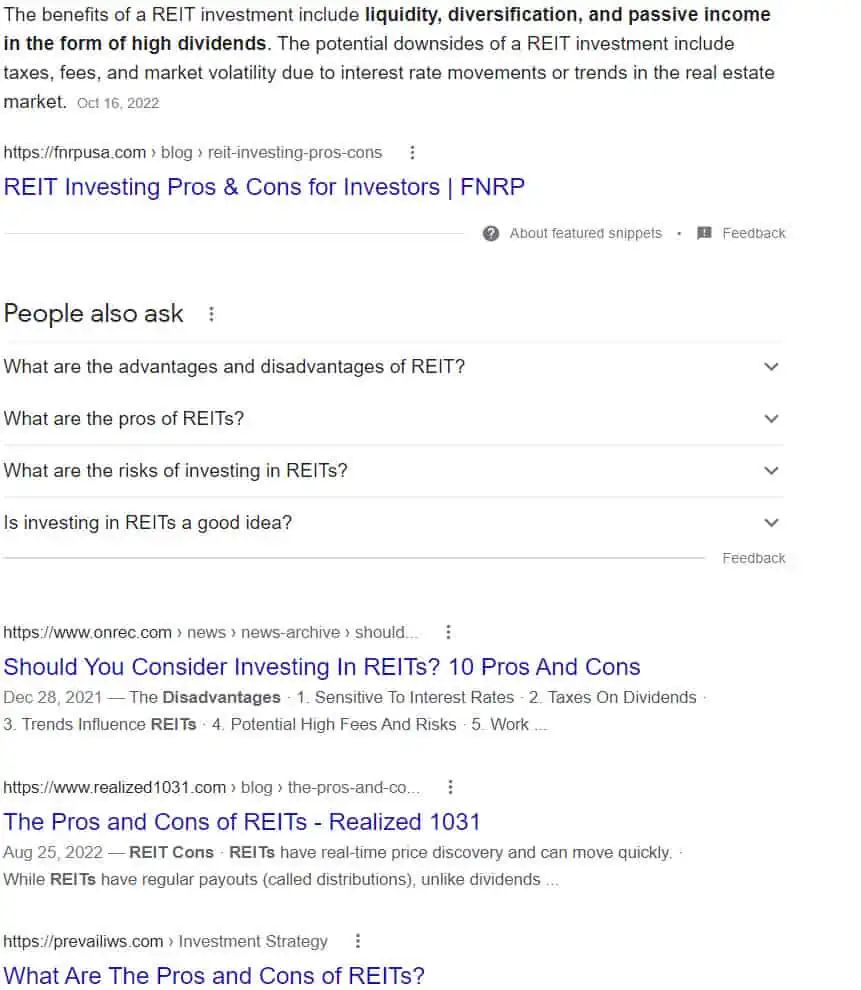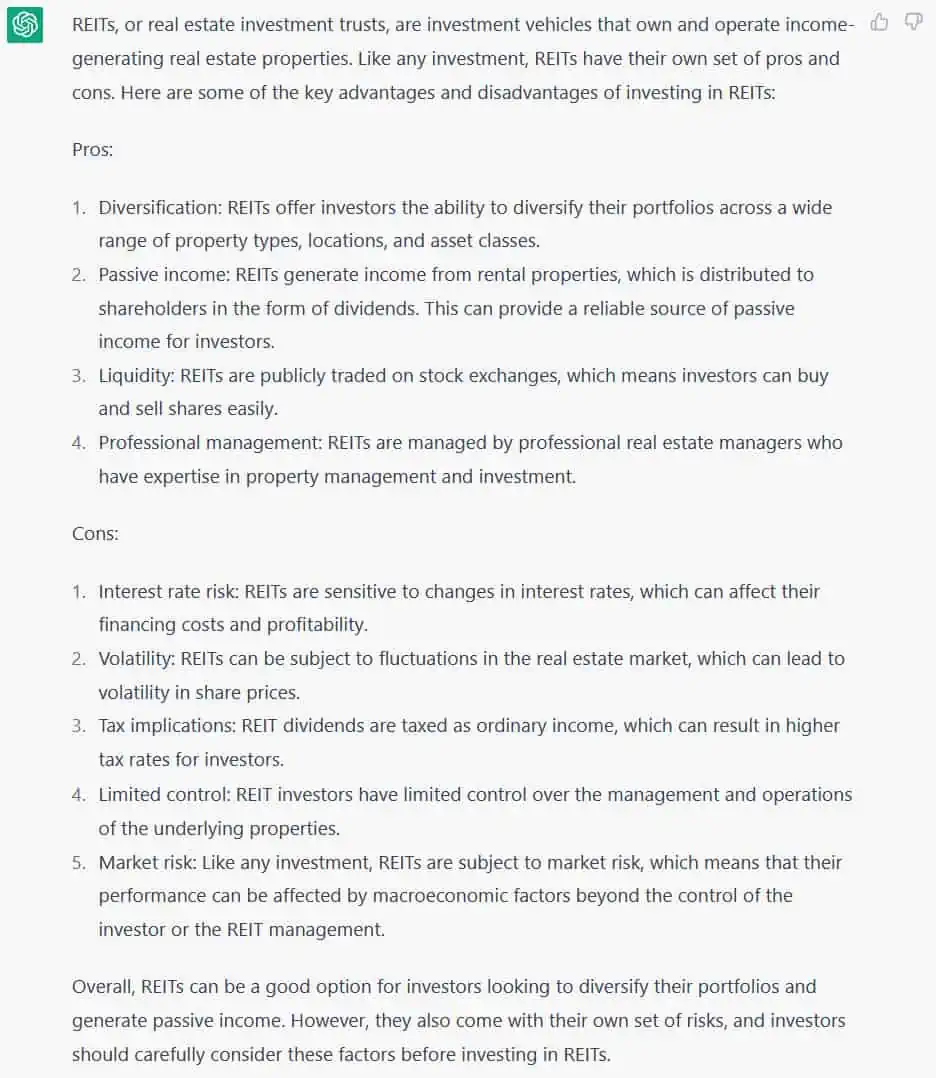
This time the robots really are coming for your job—if you work at Google, that is.
Microsoft sent shockwaves rippling across the tech industry when it announced a partnership with OpenAI to incorporate ChatGPT technology into its Bing search engine. Google responded with its own artificial intelligence (AI) program Bard, but it flopped harder than a fat man off the high dive in its first demonstration.
Even so, Google search isn’t exactly broken. Sure, it inundates you with sponsored results, and bigger companies can manipulate the rankings with better SEO techniques. But its algorithm has been refined over a quarter century, and it generally points you in the right direction when you ask it queries.
So just how well does ChatGPT stack up against Google search? In particular, how well can ChatGPT give accurate answers to real estate investing questions?
We decided to put it to the test, pitting it against Google search results in a head-to-head showdown.
How Does ChatGPT Work Compared to Google?
Before diving into the test questions and results, it’s worth pausing to understand how ChatGPT works differently than Google.
The “GPT” in ChatGPT stands for generative pre-trained transformer (no wonder OpenAI abbreviated it). It’s a large language model chatbot, and it analyzes mountains of data to generate language based on patterns in that data. With its predictive text generation, OpenAI designed it to feel more like a human interaction than a simple data query.
ChatGPT can carry on a conversation, write simple essays or synopses, and help debug code. It can even mimic humor and sarcasm, with varying degrees of success.
You already know how Google’s search engine works: you type in a query, and Google lists the most relevant results for you from around the web. No one knows their exact algorithm, of course, but they use a combination of relevancy, quality, and webpage authority to rank search results.
The crucial difference between the two models? ChatGPT assembles its own answers by assimilating millions of similar answers across the internet. Google presents you with a list of human-written web pages, and you click the ones that look the best fit. Even when Google presents you with quick “snippet” answers without you having to click through to a search result page, they lifted those answers directly from a human-published page.
All right, enough with the tech-in-toddler-terminology, let’s ring the bell on this boxing match.
Test: Real Estate Investing Questions & Answers
Real estate investors need news and data to stay up to date on trends. They need to constantly learn and grow if they want to invest profitably.
So how well can ChatGPT keep us informed compared to traditional search engines?
To find out, I asked both Google and ChatGPT five real estate investing questions. I tried to mix them up, to reflect the different types of questions that real estate investors need to answer.
I copied and pasted these questions verbatim into Google and ChatGPT, and they answered as follows.
What are the ten counties in the U.S. with the cheapest land?
Google came up with the following response to that question:
On the one hand, I appreciate that Google includes the date each page was published. But the most recent page update among the top ten results dates to June 2022, fully eight months before I ran that query.
Or is it? The top ranking result has clearly been updated in 2023, because it says so in the page title. But Google displays the original publication date of June 18, 2020. Now I don’t know if the author just changed the title, or if they’ve actually updated the list this year.
As for ChatGPT, I found myself pleasantly surprised by their answer:
They not only listed ten of the cheapest counties in the U.S., but they even included the median price per acre. I cross-referenced ChatGPT’s list against a few of the top Google results, and they appeared to check out.
Still, the information is several years out of date: ChatGPT only has access to data up to and including 2021, but no new information published after that. That limits ChatGPT’s current usefulness, at least for ever-evolving information such as property values.
Where are the best cities for rental investing in 2023?
I expected ChatGPT to struggle with this one, and sure enough, it did.
Google provided the following results when I searched for this question:
Listing the first cities from a larger list is a user-friendly experience, as are the related questions and answer snippets. I even got a kick out of Mashvisor publishing their 2023 list of best cities back in December 2022, clearly marked in the search results. (While we’re on the topic, check out our review of Mashvisor, they offer some nifty real estate investing data.)
When I clicked through a few of the results, I unsurprisingly found a wide range of criteria used to determine the “best” cities for rental investing. Top ranking result ManageCasa included economic and demographic measures like unemployment rates, population growth, and job growth, but on the real estate side mostly just showcased recent property price and rent growth. Mashvisor focused more on cap rates, cash-on-cash returns, and average days listed on the market.
Ultimately, I asked a deceptively simple question with a complex set of answers. By reading through a few of the top results, I can get a sense for how different experts combine the many factors that go into identifying good cities for investing.
ChatGPT answered the question as follows:
The AI bot’s answer summarized a few of those relevant factors, but the list was far from comprehensive. Worse, it didn’t even answer my question.
I didn’t love Google’s top search results, but I hated ChatGPT’s answer.
What are some creative ways to house hack?
I swear I didn’t rig these Google search results:
Granted, Google does sometimes remember your browsing history and feed your favorite sites back to you. Still, Google coughed up some of the best results on the web, if I do say so myself.
ChatGPT didn’t do badly with it, either:
They provided six common examples of house hacking, with just enough explanation to make it clear what they meant. But they defined house hacking too narrowly in their intro paragraph, only covering the multifamily house hacking strategy. They didn’t offer many creative ideas for house hacking either, only starting to get outside the mainstream a little with the last two entries.
What about renting out storage space? Live-in flips? Hosting a foreign exchange student?
This one goes to Google.
What are the most profitable niches in real estate investing?
If you ask ten different real estate investors in different niches this question, you’ll probably get ten different answers.
Which, of course, is exactly what you find when you search Google:
Each writer answered the question differently. Which is useful in its own way: every investor approaches the question of niches differently, and by reading a handful of different experts’ takes on it, you grasp both the complexity of the question and some specific niche ideas.
ChatGPT played it safe, boring, and bland:
Honestly, I don’t even consider REITs a “real estate investing niche.” It’s an investment vehicle rather than a strategy or specialty. In fact, individual REITs often target specific property investment niches, such as self-storage or industrial properties. Which segues nicely into the final question I asked the internet oracles.
What are the pros and cons of REITs?
Google provided some succinct and well-summarized snippets in their results:
I literally glanced at the results for three seconds and got a nice snapshot of some of the pros and cons. With a quick click through the top results, that snapshot emerged into a pretty comprehensive answer in under a minute. That said, I found that the third result answered my question best, showcasing that Google’s first results aren’t always the best.
As for ChatGPT, it answered the question as follows:
Again, the answer was true enough, as far it goes. But that’s the problem—it didn’t go far enough. One of my greatest criticisms of REITs is one that too few investors talk about: their correlation with stock markets. It’s not a 1:1 correlation, of course, but it exists—REITs sometimes crash alongside stock markets, even when real estate market fundamentals are perfectly healthy. That largely defeats the purpose of “diversification” into real estate.
Some of the top Google results touch on that drawback. ChatGPT instead touted diversification as the top advantage of REITs.
Verdict
All in all, Google outperformed ChatGPT. But ChatGPT still usually came up with a succinct summary in its answers, making it a fair starting point in outlining where to continue your search for information.
There lies the problem, though. Google invites you to keep searching, often literally, with its “People also ask” bulleted questions and snippet answers. ChatGPT spits out an answer that may be correct but brief, or an incomplete answer, or in the worst cases, a wrong answer. In all cases, there’s no prompt to dig deeper.
Don’t expect profound truths, nuanced answers, or detailed answers from ChatGPT. But if you just want a quick summary, ChatGPT can usually provide one.
ChatGPT’s (Current) Limitations
ChatGPT and AI bots, in general, remain in their infancy. It doesn’t take a huge leap of logic to imagine uncannily smart AI chat and search features within the next five years.
As touched on above, ChatGPT only has access to data up to 2021. That will change in the near future, making it more formidable.
ChatGPT also suffers from insufficient bandwidth to meet its current demand. Often when you go to use it, you get a message turning you away because its servers are at capacity. That, too, will change as it scales.
Much has been made of the risk of bias in AI, and that risk is real, but it too will fade with time and better programming.
Google isn’t perfect. Bigger companies can spend more on content marketing, SEO, and link building to jigger their pages to the top of the search rankings. But the best content (and top Google search results) are written by subject matter experts with deep personal experience. If search incorporates more AI responses cobbled together by content across the web, it leads to impersonal, bland results even if those results get more accurate.
That worries me the most: the diminishing of expert human voices on the internet, because it no longer pays to publish them when search queries don’t drive much traffic to individual pages anymore.
Final Thoughts on ChatGPT vs. Google
For decades now, we’ve all relied on search engines like Google and Yahoo and DuckDuckGo (for the privacy-minded) to connect us with that news and new information. Will AI upset the apple cart and become the new way we find information?
Maybe, but not yet. The technology isn’t quite there yet, and it will take some time and experimentation for search engines to find the best way to incorporate AI answers with expertise from real live humans.
In the meantime, have fun playing with ChatGPT, but don’t rely on it for your real estate investing strategy.


